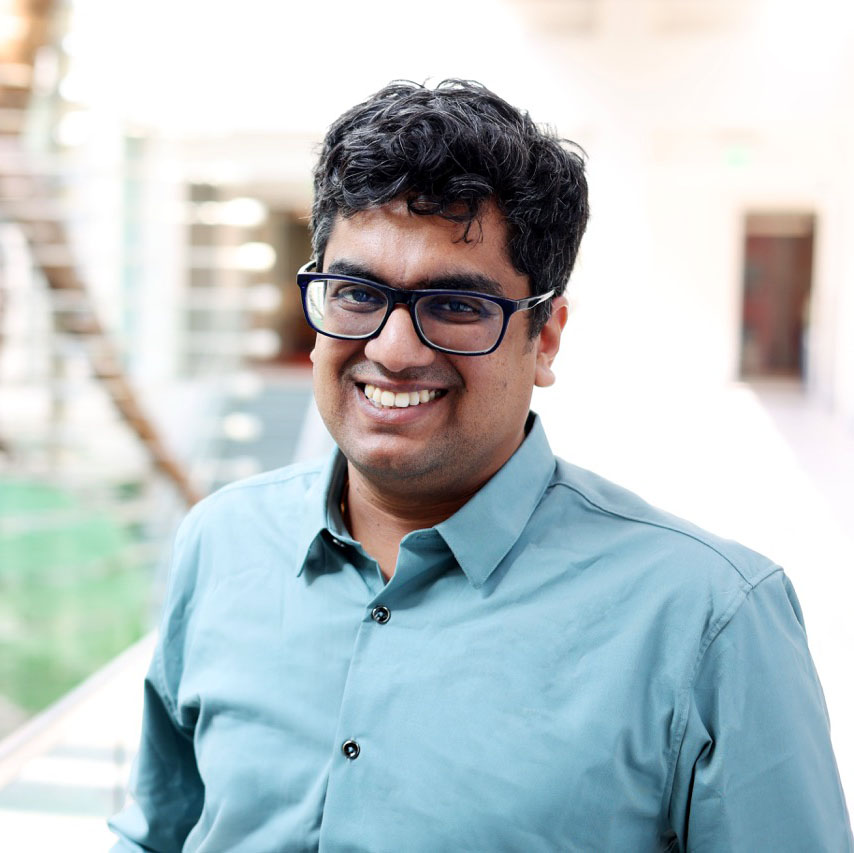Meet Raghav Venkatraman
Raghav Venkatraman joined the Department of Mathematics as an Assistant Professor this year.
 Tell us a little about your background.
Tell us a little about your background.I'm Raghav Venkatraman, a new assistant professor of mathematics at the U. I was born
in the south Indian city of Bangalore, where I spent most of my life until graduate
school.
My early exposure to mathematics through high school was through math olympiads; Euclidean
geometry and inequalities were my favorite kinds of problems. Perhaps surprisingly
(or not!), a number of problems that I work on as a research mathematician rely on
tools from geometry and making analytical estimates or inequalities.
I also had a close group of friends from my high school, and we studied topics in
math that were beyond the school curriculum together and discussed problems; the community
aspect of mathematics has always been an important part of the experience for me.
Where did you earn your degrees? What was your path to the University of Utah?
I did my undergraduate degree in mechanical engineering at an Indian Institute of
Technology; it was this experience that drew me to applications of mathematics. After
my undergraduate degree I switched to mathematics. It was a happy accident when I
got admitted to the PhD program at IU Bloomington, where I was fortunate to be advised
by Peter Sternberg (and then in the second half of my PhD, co-advised by Dmitry Golovaty).
Even though the beginning of grad school, and the transition to mathematics from engineering
was quite difficult, I am very glad to have persisted. Subsequently, after two incredibly
rich postdoctoral experiences at Carnegie Mellon and the Courant Institute, I am delighted
to start a tenure-track career at the U.
Tell us about your research interests in a paragraph or two.
My training is as an applied analyst. I work in the calculus of variations and partial
differential equations. This means that the problems I work on are drawn from applications
(from science, engineering, and most recently statistics/machine learning), but I
use mathematical tools to offer qualitative/quantitative descriptions of solutions
to problems where direct computation is formidable.
Some application areas I've worked on include materials science, photonics, and statistical
inference questions on the geometry of data. I enjoy "unity in mathematics," and the
problems I work on frequently use tools from neighboring branches of math, such as
geometric measure theory, harmonic and functional analysis, differential geometry,
and (a bit of) probability.
What do you enjoy most about being at the University of Utah?
Our department has a long tradition of expertise in my areas of interest, and I'm
tremendously excited to be part of this (and work with world leaders in applied analysis).
I think there are very few departments in North America that have a concentration
of applied analysts like our department does. This makes it very exciting to be here
at a professional level. At a personal level, the department and the SLC area have
been very friendly and welcoming to our family. SLC (and the tightly knit community
associated to the U) promises to be a pleasant place to raise a family.
What are three things you like to do in your spare time?
My wife and I are big enthusiasts of Indian classical music, and we spend a lot of
time listening to songs and singing. We have a 4.5-year-old daughter whom we absolutely
dote on (and a second one on the way!) and a lot of my time at home is spent reading
to her, playing/riding a bike with her, or making up silly songs. Finally, by myself
I enjoy long walks in nature, and I'm looking forward to the abundant richness of
nature Utah has to offer in this regard.
Is there anything else you'd like to share with us?
An incredible aspect about our department is its broad range of expertise in fields
close to my areas of interest. Naturally, then, I'm looking forward to leveraging
this breadth favorably by exploring interdisciplinary collaborations with members
of our department. More generally, I'm very much looking forward to integrating with
the broader community in our department, working with students and postdocs, and contributing
to the fabric of applied mathematics at the U. If you'd like to get to know me or
my work better, feel free to reach out or drop by my office.
